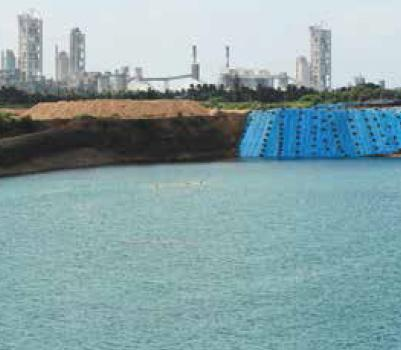Water Stewardship
In an era where water scarcity poses a significant challenge, Ambuja Cements has taken decisive steps towards sustainable water management, underscoring the critical need for ensuring water security for both its business operations and the communities it serves.
Ambuja Cements has implemented a robust water stewardship policy to ensure its responsible management. Decisive actions and innovative solutions have been the cornerstones of Ambuja's approach. By focusing on reducing specific water consumption per ton of product, maximizing the recycling of treated wastewater, harvesting rain water and implementing rigorous water efficiency measures, Ambuja has significantly decreased its footprint on freshwater resources from its operations.
Through the water stewardship efforts, the Company aims to contribute to a more sustainable future for all, where there is assured access to clean, safe, and abundant water for future generations.
At the heart of Ambuja's initiative lies a strategic framework with clear objectives:
- Reducing Dependence on Freshwater: Ambuja Cements seeks to minimise its reliance on freshwater resources for its operations.
- Community Water Security extending beyond Business Interests: Ambuja Cements is committed to ensuring water security for communities residing beyond its immediate boundaries.
- Being Water-positive: The aim is to continue being water-positive through sustainable water management practices.
While the Company’s operational sites rely on diverse water resources to meet their needs, it is aware of the importance of minimising its impact on shared water sources. To achieve this, the Company continuously evaluates and optimises its water withdrawal processes, aiming to implement efficient and sustainable water management practices. By actively adopting efficient water management practices, Ambuja Cements ensures it uses water judiciously and responsibly.
5.6 million KL fresh water consumed
59% fresh water consumption from rainwater harvested


As part of the Company's commitment to sustainable practices. Ambuja cement has implemented robust wastewater recycling and reuse practices across its units. These initiatives aim to maximize water efficiency, minimise its reliance on freshwater sources, and reduce its water footprint.
12.2% water recycled/reused
The wastewater generated at plants is treated and recycled for gardening and dust suppression activities. There is no discharge of wastewater outside the premises. Ambuja Cements has effectively minimized and conserved its water footprint by adopting these practices.

The Company started investing in water conservation efforts for communities very early. It collaborated with community representatives, local governments, other donors and like minded organisations to invest in its efforts towards drinking water security, water for livelihood and water use efficiency. The Company has undertaken extensive awareness-building campaigns, educating communities on rainwater harvesting, water literacy, and the adoption of modern irrigation technologies. Ambuja engaged with communities to revive village ponds, executing rainwater harvesting to ensure drinking water security, partnering with the government for water conservation projects like check dams, undertaking water use efficiency measures, ensuring more crop per drop etc. These efforts have borne fruit, with tangible results evident in the form of increased rooftop rainwater harvesting systems, expanded surface water storage, and the adoption of micro-irrigation techniques by farmers.
- Using many of the Company’s closed mine pits for water conservation by rainwater harvesting and groundwater recharge to ensure water availability for livelihoods
- Engaging with rural communities to revive village ponds
- Executing rainwater harvesting in communities to ensure drinking water security
- Partnering with the government for water conservation projects like check dams
- Associating with developers for rainwater harvesting in projects
- Developing an in-house modular (zero-water) curing solution
- Undertaking water use efficiency measures, ensuring more crop per drop
Recognising that water conservation is a collective responsibility, Ambuja Cements engages with developers and communities to promote water conservation practices that align with its water management strategy. The initiatives include the following:

The efforts on sustainable water management are ongoing. The initiatives have led to much lesser water debit than water credit. As a result, Ambuja Cements which was two-times water positive in 2011 became eleven-times water positive in 2024.
Through a holistic approach encompassing operational efficiency, innovation, and community engagement, Ambuja Cements has set a benchmark in responsible corporate water management, inspiring not just the industry but society as a whole to tread the path towards a water-secure future.
